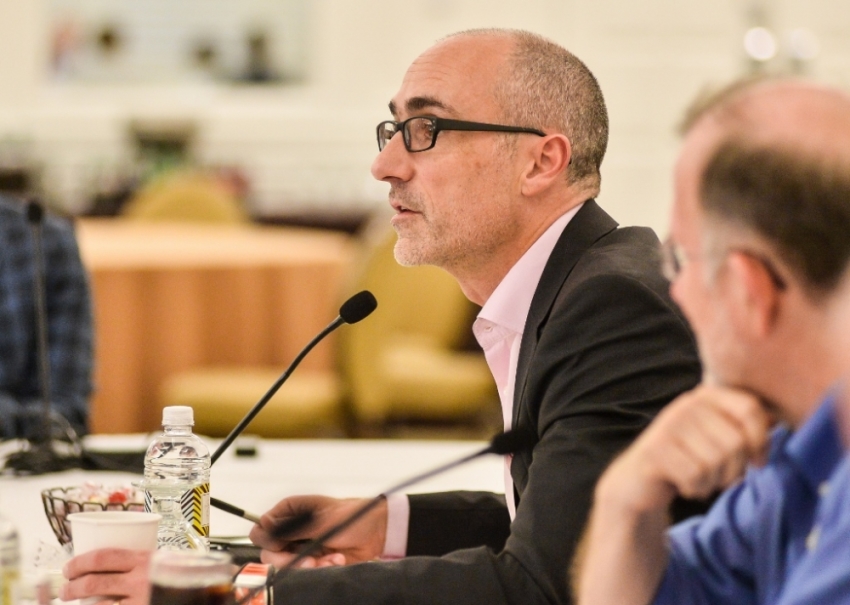Can You Glorify God as an Economist? Arthur Brooks on Religion, Economics and Poverty

MIAMI BEACH — If your purpose in life is to glorify God, why become an economist? Christian economist Arthur Brooks answered this question at a November Faith Angle Forum.
Brooks, president of the American Enterprise Institute, was a french horn player, living in Barcelona, during a "soul searching" time of his life when he heard a J.S. Bach quote that influenced him.
After being asked, "why do you write music?" Bach answered, "The aim and final end of all music is nothing less than the glorification of God and the enjoyment of man."
That quote, and reflecting on his purpose in life, led Brooks, a Catholic, to leave music and begin a career in economics.
Bach's quote, Brooks explained, was a reiteration of Luke 10:27, "Love the Lord your God with all your heart, with all your soul, with your strength, with all your mind, and love your neighbor as yourself."
Brooks noted that choosing economics to glorify God must sound strange: "I want to tell you how that works, because it sounds almost like science fiction, that if you really want to ... glorify God the most, that you'd go anywhere near the dismal science. It doesn't make sense."
Brooks studied economics, though, with one question in mind: "How do people stop being poor?"
The answer he found changed his life. It led him to become a college professor and later join AEI.
Faith Angle Forum treats about 20 reporters twice a year to deep discussions of religion, culture and politics with renowned experts at a Miami Beach resort.
Brooks led his talk by noting, "There aren't very many talks that I can give where I can start by confessing that I am a Christian. ... Starting off a talk saying that I'm a Christian would somehow be subversive in the environment, and particularly in Washington D.C. where I live."
Brooks was astounded to discover there was an 80 percent decline in global poverty since he was a child.
(Brooks was born the day before President Lyndon Johnson's famous "Great Society" speech. "I remember the speech," he joked.)
"Two billion people were pulled out of starvation level poverty. It is a miracle. It is a humanitarian achievement on a scale that we've never seen since the beginning of history and it's the first time ever that that's happened," Brooks explained.
This massive level of poverty eradication did not happen, Brooks said, by central planning or the International Monetary Fund. Instead, it happened, "all economists of repute who understand world development know," through five things: globalization, free trade, property rights, the rule of law and entrepreneurship.
Learning that, Brooks said, is what led him to devote his life to improving the lives of the next 2 billion people still in poverty.
Brooks' talk also focused on poverty in the United States. While those in the top half of the income scale are doing well, those in the bottom half are falling behind, he noted.
The way to help the poor in America, Brooks says, is 90 percent a culture shift in ethics, values and morals regarding those living in poverty and 10 percent about policy change.
The philosophical shift needed, Brooks believes, is to understand, "we need the poor," an idea that is "subversive to modern economics."
"If there's one consensus around which the modern economy is based it's that the poor are superfluous. That the poor are not necessary, that we don't need the poor," he said.
Instead of thinking of the poor as a problem to be managed, they should be thought of as a resource to be developed, Brooks said.
Historically in America, he continued, the poor were recognized as needed, and "the essence of human dignity is to be necessary."
"If [the poor] came here of their own volition, were they steaming into Ellis Island saying, 'Sure is great to be in America where I can get a better system of forced income redistribution?' Not so much. They were saying, 'I want to build my life,'" he said.
That mindset changed, Brooks believes, with the Great Society programs of the 1960s. Those programs spent $22 trillion to lower the poverty rate from 15 percent of the population to 14.7 percent of the population.
"Is it easier to be in poverty? Yes. Is it better to be in poverty? You tell me," Brooks asked.
The poor went from being needed, assets to develop, to being superfluous, liabilities to manage.
"The day that you say that somebody's a liability to manage is the day that you've given up on that person and you have a fundamental change in your country," Brooks said. "Think about what that would mean if you did that to one of your children."
You can listen, watch or read the transcript of Brooks talk, followed by a response from John Carr, director of The Initiative on Catholic Social Thought and Public Life at Georgetown University, and the Q&A with reporters here at the Ethics and Public Policy Center website.



























